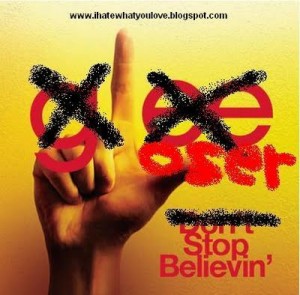I personally am not a Glee fan. This stems from both my dislike of lame television and musicals. Putting these two together is not the key to winning a fan like myself over. Still, Glee has rapidly gained a strong and large following, according to Hilderbrand a “cult audience with its genre-bending and improbable choir group covers.” It is a show that basis itself off of the concept of a musical. It is millennial in the sense that it is not the typical story line you envision for a high school television show. It is not a program centered on jocks and cheerleaders, but rather theatre and choir kids. Tearing down these norms could’ve contributed to the unique audience for the show.
The program also attempts to tackle diversity problems, dealing with minorities and homosexuals. The show’s appeal is that it takes kids out of stereotypes and allows them to do what they want. Characters are permitted to live their lives how they choose without the pressures of traditional high school. Glee according to Hilderbrand, “Not unlike high schoolers themselves has awkwardly struggled to find its own identity and politics.” The show is starting a new wave of television; it does not conform to traditional expectations of society. This was the premise at least, but as the show progressed it became evident that the characters were fitting into molds, just not the molds traditionally exemplified by television.
Even with all of the attempts to make the show diverse, the white characters are still the leads. They dominate both the show and the solos. The program is attempting to appeal to minorities with its casting, but as explained by Hilderbrand, “In its matchmaking, the show has been consistently segregationist: the white, straight, able-bodied kids only date within their own demo, whereas the various minority characters have primarily had failed flirtations amongst themselves.” Glee attempts to portray itself, as a new age diverse show, but when we parse out the fluff it is a show not different from any other. It is filled with racism and elitism. It is a show that simply changes the setting but keeps the traditional storyline we are all so accustomed to.
The pilot episodes conclusion could not have been any more perfect. It culminates with a performance of, a choral cover of Journey’s “Don’t Stop Believin’.” It is almost pleading to the audience, please don’t stop believing, we will get better. Glee is a show with a strong following, but it is not one that this view will follow. It is a show that has a strong following, I wonder if this has anything to do with the emergence of interactive television. Glee has become a sing-a-long for its audiences. I think this fan interaction could contribute to its cult like followers.

I completely agree, the show should not aim for diversity if they are not going to fully commit to the cause.
“Even with all of the attempts to make the show diverse, the white characters are still the leads. They dominate both the show and the solos.” Real Talk. The show does not seem to diverge from standard norms of White vs. Minority well at all, and definitely hurts the authenticity of the series.